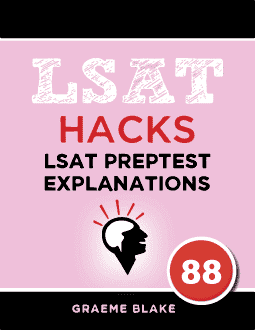QUESTION TEXT: A study of 30 years of weather pattern records of several…
QUESTION TYPE: Necessary Assumption
CONCLUSION: Human activity has large-scale effects on weather.
REASONING: 30 years of data showed weekends are cloudier than weekdays. Few natural 7-day cycles can have significant impact on weather patterns.
ANALYSIS: This argument pointed out human activity as responsible for 7 day cycles in the weather since natural 7-day cycles weren’t responsible. But what about non-7 day natural cycles?
What if a 3-day rainy period caused 7 days of cloudiness? Rain is still natural, and so casts doubt on the author’s conclusion. We need to rule out these possibilities. So the correct answer would need to say that a 7-day cycle requires a 7-day cause, which in this case, would be the human 7-day work week.
___________
- This answer choice focuses on the weekend and industrial activity, which is too specific. We’re concerned with 7-day cycles, not just the weekend. As well, the cause doesn’t need to be the decrease in industrial activity; it could be that there is less car pollution since people don’t need to commute on the weekends.
- This is an extreme answer, we don’t know if there aren’t any naturally occurring 7-day cycles and the stimulus never mentioned if there are any. Not to mention, the stimulus already said that there are a few 7-day cycles.
- The stimulus doesn’t use conditional logic so the correct answer choice shouldn’t be introducing any. “Living organisms” and how they affect weather patterns also aren’t mentioned in the stimulus.
- Like C, this shouldn’t be introducing conditional logic. It also doesn’t have to be true. A tsunami could affect weather patterns but it’s not cyclical.
- CORRECT. The author needs to assume that a 7-day weather pattern has a 7-day cause in order to conclude that the 7-day work week (human activity) has impacted weather.
Recap: The question begins with “A study of 30 years of weather pattern records of several”. It is a Necessary Assumption question. Learn how to master LSAT Necessary questions on the LSAT Logical Reasoning question types page.


In regards to AC C, can you tease out why in necessary assumption questions, if the stimulus does not use conditional logic, the answers should not have conditional logic as well? Sorry, I am a bit slow here! And does this rule apply to other question types?
It’s more of a general rule than an absolute, but conditional logic is mostly powerful when paired with other conditional statements. If you have more than one you can connect them for a deduction. With only one, it’s just an isolated statement.
But probably the better answer here for a necessary assumption answer is that negating a conditional statement has no impact most of the time. Do you care about the difference in any of these:
* You always get what you want —> You get what you want, except there was once a tiny exception where you failed to secure your preferred breakfast
* Everyone likes you —> all but one person likes you and you don’t care about that person
Because negating a conditional does little, it generally won’t be right. Exception might be if conditional language was used, because then you would need 100%
This rule doesn’t necessarily apply to all Q types but in general conditional statements are more useful with more than one.